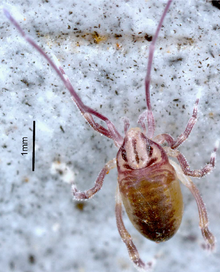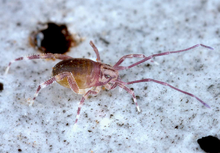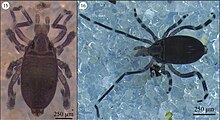Opilioacaridae is the sole family of mites in the order Opilioacarida, made up of about 13 genera.[2][3][1] The mites of this family are rare, large (1.5 to 2.5 mm) mites, and are widely considered primitive, as they retain six pairs of eyes, and abdominal segmentation.[4] They have historically been considered separate from other mites belonging to Acariformes and Parasitiformes, but are now generally considered a subgroup of Parasitiformes based on molecular phylogenetics.[5]
| Opilioacaridae Temporal range:
| |
|---|---|

| |

| |
| Specimens of Opilioacarus baeticus | |
| Scientific classification | |
| Domain: | Eukaryota |
| Kingdom: | Animalia |
| Phylum: | Arthropoda |
| Subphylum: | Chelicerata |
| Class: | Arachnida |
| Superorder: | Parasitiformes |
| Order: | Opilioacarida |
| Superfamily: | Opilioacaroidea Johnston, 1968 |
| Family: | Opilioacaridae With, 1902 |
| Synonyms[1] | |
| |

The first member of the Opilioacarida to be discovered was the Algerian species Opilioacarus segmentatus, which was described by Carl Johannes With in 1902, followed by the Sicilian Eucarus italicus and Eucarus arabicus from Aden, both in 1904.[6] Two fossil specimens are known, one of which was discovered in Baltic amber from the Eocene,[7] while the other one was discovered in the Burmese amber from the Late Cretaceous (Cenomanian) around 99 million years old, tentatively assigned to the living genus Opilioacarus.[8]
Members of the group live in semi-arid and tropical environments in leaf-litter, under rocks and in caves. Their diet is known to include arthropod carcasses, fungal spores, and pollen.[9]
Genera
editThese 13 genera belong to the family Opilioacaridae:
- Adenacarus Hammen, 1966
- Amazonacarus Vázquez, Araújo & Feres, 2014
- Brasilacarus Vázquez, Araújo & Feres, 2015
- Caribeacarus Vázquez & Klompen, 2009
- Indiacarus Das & Bastawade, 2007
- Neocarus Chamberlin & Mulaik, 1942
- Opilioacarus With, 1902
- Panchaetes Naudo, 1963
- Paracarus Chamberlin & Mulaik, 1942
- Phalangiacarus Coineau & Hammen, 1979
- Salfacarus Hammen, 1977
- Siamacarus Leclerc, 1989
- Vanderhammenacarus Leclerc, 1989
References
edit- ^ a b "Opilioacaridae". GBIF. Retrieved 2021-10-31.
- ^ Beaulieu, Frédéric (2011). Zhang, Zhi-Qiang (ed.). "Superorder Parasitiformes: In: Zhang, Z-Q. (ed.) Animal biodiversity: an outline of higher-level classification and survey of taxonomic richness". Zootaxa. 3148. doi:10.11646/zootaxa.3148.1.23. ISBN 978-1-86977-849-1. ISSN 1175-5326.
- ^ De Araújo, M. S.; Palma, A. D.; Feres, R. J. F. (2020). "Catalog of the Opilioacarida (Acari: Parasitiformes)". Zootaxa. 4895 (3): zootaxa.4895.3.2. doi:10.11646/zootaxa.4895.3.2. PMID 33756891. S2CID 230560703.
- ^ J. A. Dunlop & G. Alberti (2008). "The affinities of mites and ticks: a review" (PDF). Journal of Zoological Systematics and Evolutionary Research. 46 (1): 1–18. CiteSeerX 10.1.1.496.5455. doi:10.1111/j.1439-0469.2007.00429.x.
- ^ Vázquez, Maria Magdalena; Ávila Herrera, Ivalú Macarena; Just, Pavel; Reyes Lerma, Azucena Claudia; Chatzaki, Maria; Heller, Tim Lukas; Král, Jiří (2021-09-30). "A new opilioacarid species (Parasitiformes: Opilioacarida) from Crete (Greece) with notes on its karyotype". Acarologia. 61 (3): 548–563. doi:10.24349/acarologia/20214449. S2CID 236270478.
- ^ Mark S. Harvey (2002). "The neglected cousins: what do we know about the smaller arachnid orders?" (PDF). Journal of Arachnology. 30 (2): 357–372. doi:10.1636/0161-8202(2002)030[0357:TNCWDW]2.0.CO;2. S2CID 59047074. Archived from the original (PDF) on 2012-02-07.
- ^ Jason A. Dunlop; Jörg Wunderlich & George O. Poinar Jr. (2003). "The first fossil opilioacariform mite (Acari: Opilioacariformes) and the first Baltic amber camel spider (Solifugae)". Transactions of the Royal Society of Edinburgh: Earth Sciences. 94 (3): 261–273. doi:10.1017/S0263593300000663. S2CID 85646963.
- ^ Jason A. Dunlop & Leopoldo Ferreira de Oliveira Bernardi (2014). "An opilioacarid mite in Cretaceous Burmese amber". Naturwissenschaften. 101 (9): 759–763. doi:10.1007/s00114-014-1212-0. PMID 25027588. S2CID 253637881.
- ^ Moraza, María L.; Prieto, Carlos E.; Balanzategui, Iñaki (2021-03-30). "A new species of the genus Opilioacarus With, 1902 (Acari: Opilioacarida) for the Iberian Peninsula". Acarologia. 61 (1): 128–147. doi:10.24349/acarologia/20214422. S2CID 233786254.
External links
edit- Data related to Opilioacarida at Wikispecies